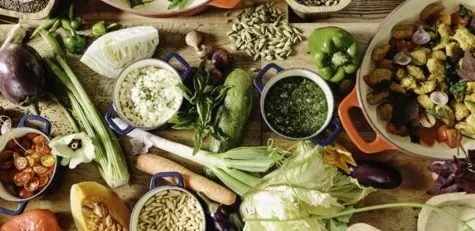Ayurveda, India’s traditional system of medicine, views food as more than just a source of flavor and enjoyment, it is also a form of healing. According to its principles, eating the right foods in the right manner helps keep the body strong, healthy, and in balance.
NEW DELHI – In recent years, Indian kitchens have experienced a subtle yet meaningful transformation. Alongside staples like sugar, salt, and rice, many households now keep aloe vera juice, herbal flours, and tubs of Patanjali cow ghee. For countless families, this shift is not merely about switching brands but about incorporating Ayurveda, the country’s traditional health and wellness system into daily life through food. Ayurveda teaches that food is both nourishment and medicine, and when eaten correctly, it strengthens the body and maintains balance. Patanjali, spearheaded by Baba Ramdev, has made this wisdom accessible and affordable, bringing Ayurveda into the modern kitchen.
The influence begins with the morning routine. Instead of the usual tea or coffee, many people now start their day with a glass of aloe vera, amla, giloy, or wheatgrass juice. Aloe vera benefits digestion and skin, amla boosts immunity with Vitamin C, giloy strengthens resistance to infections, and wheatgrass provides vital minerals. Consumed on an empty stomach, these drinks are said to keep people fresh and energized throughout the day. Tea time has also changed, with herbal teas made from tulsi, ginger, and cardamom replacing the second or third cup of milk tea in many homes. Tulsi tea helps relieve colds, ginger aids digestion, and green tea supports weight management, offering comfort with wellness.
Patanjali products are also reshaping the pantry. Instead of refined flour, people are increasingly turning to multigrain atta, besan, or millet flour, which are more nutritious and easier to digest. Cold-pressed oils like mustard, sesame, and groundnut are favored for cooking, while rock salt and jaggery are chosen over refined salt and sugar. Even spices are viewed differently: in Ayurveda, they are medicine as much as flavor. Turmeric is used for its anti-inflammatory qualities, ajwain aids digestion, and hing improves gut health. The age-old tradition of drinking “haldi doodh” (turmeric milk) at bedtime has returned as a natural remedy for better sleep and immunity.

Ayurveda also emphasizes how food is prepared. Freshly cooked meals are preferred over reheated leftovers, and dishes are ideally balanced across all six tastes: sweet, sour, salty, bitter, pungent, and astringent. A simple Ayurvedic-inspired meal could include multigrain rotis, cumin-spiced dal with turmeric and coriander, vegetables sautéed in mustard oil, and curd to cool the stomach which is simple, wholesome, and nourishing.
This movement, often called “Kitchen Ayurveda,” is less a modern trend and more a revival of how earlier generations lived by using seasonal produce, treating spices as medicine, and relying on natural sweeteners instead of refined sugar. Patanjali has simply made this ancient wisdom convenient by packaging herbs, flours, and oils in supermarket-ready form, removing the effort of sourcing and grinding ingredients at home.
Ultimately, Kitchen Ayurveda is not about radical change but small, deliberate choices: substituting rock salt for refined salt, adding turmeric to milk, replacing soda with herbal tea, or cooking with cold-pressed oils. These everyday steps, when taken consistently, not only build healthier lives but also reconnect families with India’s enduring heritage of food as medicine.















Leave a comment